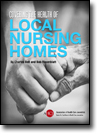After analyzing 4,703 death certificates of folks who died at adult homes during a five-year span, The Seattle Times‘ Michael Berens found “at least 236 deaths that indicate neglect or abuse in these homes but were not reported to the state or investigated.”
In a sidebar, he explains that Times staff searched for cases that indicated neglect or low quality of care, and that the journalists’ careful standards and reliance on death certificates (none of which involved autopsies) means their estimate is likely on the low end.
There are almost 3,000 adult homes in Washington State. In the past decade, they’ve earned the state a national reputation for elder care innovation, but also opened a gaping hole in the regulatory fabric, as Berens has reported previously. On the whole, they’re billed as cheaper and more neighborhood-like than nursing homes. They’re also less regulated and, Berens found, more likely to fatally neglect patients. Here are his numbers:
… adult-home deaths indicating neglect occur at strikingly higher rates than comparable deaths at nursing homes:
- Pressure-sore deaths in adult homes occur at a rate more than 3.5 times higher.
- The rate of deaths from falls is four times higher.
- For choking deaths, the rate is 15 times higher.
Beyond the highlights, Berens’ piece is exhaustively researched, and most definitely required reading for anyone reporting from one of the dozens of states seeking to emulate Washington’s adult home system.
 Slim guide:
Slim guide:
Covering the Health of Local Nursing Homes
Check out AHCJ’s latest volume in its ongoing Slim Guide series. This reporting guide gives a head start to journalists who want to pursue stories about one of the most vulnerable populations – nursing home residents. It offers advice about Web sites, datasets, research and other resources. After reading this book, journalists can have more confidence in deciphering nursing home inspection reports, interviewing advocacy groups on all sides of an issue, locating key data, and more. The book includes story examples and ideas.
AHCJ publishes these reporting guides, with the support of the Robert Wood Johnson Foundation, to help journalists understand and accurately report on specific subjects.

Other resources
- Aging Nation: Troublesome Health Care Issues
- Headlines an advocate for seniors would like to see
- The impact of aging upon health care
- Covering nursing homes and other issues of aging
- How will retiring boomers affect the national health agenda?
- You Can Run, but You Can’t Hide: Policy and Problems in Long-Term Care
- Biology of Aging: Sources and Resources




